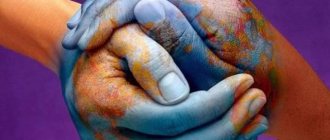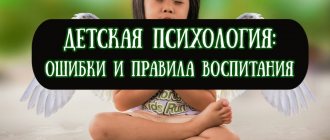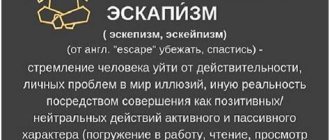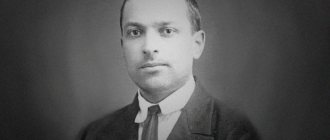On the key concepts of spiritual and moral education
Education in the life of society
The constant decline of the people is only an external manifestation of the deep-seated painful changes taking place in the consciousness of modern Russian people. This happens when a people loses the will to live, forgets about education - about the natural reproduction and multiplication of oneself in a succession of generations for every healthy community of living beings. In human communities, which differ from mere animals by a special quality - spirituality, education should be primarily spiritual. Even bodily nutrition, the peculiarities of the cuisine of different nations are necessarily based on some ideological, usually doctrinal, ideas (on a whole series of spiritually based rules of abstinence, on food prohibitions, etc.). In the same way, bodily exercises, games and martial arts of different peoples are rooted in their spiritual and ritual traditions (and if, for example, some Russian teenagers study the Chinese martial art of wushu in depth, then at the same time they spiritually absorb Chinese pantheism and are brought up on it and form from themselves, without realizing it, some semblance of a sect, cut off from the living whole of their own people, and some kind of, albeit absurd, grafting onto the Chinese folk tree).
Unfortunately, only very recently, at the turn of the millennium, the destructiveness of the disappearance of the educational principle from education and the entire culture was realized at the highest state level, after which the federal program “Patriotic Education of Citizens of the Russian Federation for 2001–2005” was written and adopted. Locally, their own subprograms in this area were created and implemented (for example, “Patriotic education of the population of the Novgorod region for 2002–2005”). The programs for 2006–2010 have now been adopted and are in effect.
Thus, at least in recent years, the activities of the Ministry of Education have been determined by the desire for an urgent and comprehensive restoration of the educational principle in public education at all levels: from primary school to higher education. The Government of Russia has approved the “Concept for the modernization of Russian education for the period until 2010.” As noted in 2002 at the X International Christmas educational readings by V.M. Filippov, who at that time served as the Minister of Education of the Russian Federation, “this document summed up many years of discussions about ways to develop the training and education of younger generations. Figuratively speaking, he returned the state to the sphere of education, restored the union of state and society in the education of youth, which had been subjected to difficult tests. This event contains significant spiritual and moral meaning. And this is what it consists of. First. Education is considered in the Concept “as a top priority in education.” I quote more specifically the decision of the Russian Government: “Education should become an organic component of pedagogical activity, integrated into the overall process of learning and development. The most important tasks of education are the formation of civic responsibility, legal self-awareness and spirituality in schoolchildren.”
These general methodological guidelines, as well as their testing during the implementation of state and regional programs of patriotic education, became the basis for the systemic transformation of all educational work in the field of public education planned for 2008. The expected update will significantly affect the content of knowledge passed on from generation to generation. In particular, since 2007, a new educational concept has been discussed, according to which it is planned to introduce, from 2009, into the next generation of state standards of general education the entire educational field “Spiritual and moral culture”: “The solutions proposed in the Concept will make it possible to advance beyond the currently available relative possibility ( highlighted by the authors of the Concept. - A.M.) systematic study of the spiritual and moral culture of society, including religious, familiarizing students with the spiritual and moral values and traditions of their family and people in a public public (secular) school - to guarantee such education as an integral part of the educational process”[1]. It is obvious that the proposed update will not be limited to the level of secondary education only and will subsequently affect all other levels of the educational system - from preschool to higher professional.
Now we are re-aware of a simple and obvious truth: there is simply no abstract and necessarily generally useful knowledge, all knowledge is obtained thanks to a certain worldview and bears the imprint of this worldview, its image, and it is precisely this image of being embedded in knowledge that contributes to the formation of the human personality, the soul. Knowledge is spiritual food for a person; it nourishes and educates the soul, assimilated by it, becoming its own for it. This is the deep essence of education as developing, formative and formative spiritual nutrition.
So, it is possible to talk about the loss of the educational principle in education that took place in past years only in a certain sense - in the sense of a refusal of state control in this area. In fact, a person, along with knowledge, in any case, still receives certain food, but society, people sometimes do not want to follow this extremely important matter, they let it take its course, and here education can indeed be shaken and even turn into something the opposite, since along with good spiritual food in the flow of knowledge that is not subject to verification by experienced people, poisoned, malignant food may also come across, that is, it is no longer food, but a destructive poison that does not educate, but destroys the soul (an extreme example of such “education” " – training children in criminal communities, as a result of which “good” criminals are obtained, but bad people).
Fortunately, in reality, the public education of the people cannot proceed completely spontaneously and uncontrollably. Even in cases of extreme neglect, it still consists of more or less conscious, albeit scattered actions taken in individual families for the sake of procreation (and from growing clans speaking the same language and believing in one God, a nation ). However, public education is much more effective with a conscious, purposeful and consistent influence on society as a whole, and in this case the selection of spiritual food is especially important. Recognizing the spiritual properties of knowledge based on the experience of older generations is precisely one of the main tasks of education (along with the extraction of good-quality knowledge itself).
The rapid return of the concepts “moral education”, “spiritual moral education”, “spiritual education”, “civic education”, “patriotic education” into the bureaucratic language of the state is fraught with the danger of deadening the deep root meanings of these words, that is, those meanings which developed over many centuries of our national history under the sun of Orthodoxy, but in the 20th century they faded significantly under the influence of unspiritual power.
In particular, the concept of spiritual education in its full, not truncated scope presupposes faith not only in spirituality, the incorporeality of the human soul or, if you like, the individual with its consciousness and superconsciousness (according to the usage of modern science), but also necessarily faith in the existence of superhuman spirits , both good and evil, and, above all, faith in the existence of God's Spirit. At the same time, we must remember that spirituality can be both light and dark, both good and evil, both moral and immoral. Therefore, the now increasingly used and seemingly cumbersome expression “spiritual and moral education” does not seem redundant.
Moral
The goal of education is to develop in individuals and society as a whole a certain morality - a unique ability and skill to choose and do in any life circumstances not just what they like, but only what they like, what they like. in the light of existing social experience, it is not destructive or harmful to life and therefore will contribute to its prolongation, and therefore to the preservation of the very possibility of choosing what you like in the future. A simple example: if a person, out of ignorance, likes some beautiful, tasty, but deadly poisonous fruit and eats it, then in the future he will no longer be able to repeat such a choice. Like bodily food, spiritual food carries within itself a certain internal charge of influence on a person, in this case a spiritual, ideological influence, the essence of which, ultimately, comes down to either affirmation or denial of life, that is, either morality or immorality . Any worldview that denies the eternity and enduring value of a private, unique human existence (various types of atheism, pantheism) is essentially immoral, because in one way or another it instills the idea of the end, the suppression of a given private human life. Such a worldview can logically justify any type of violence against others and oneself, any type of self-destruction (for example, drug use or outright suicide in circumstances of a seeming dead end in life).
Morality , with its desire to preserve and endlessly prolong human life, is inevitably connected with religion , for only on the basis of faith as a completely special type of knowledge can the integrity and vast infinity of existence be explained. In the life of each people, their own moral (or relatively moral) view of the universe as a whole is developed. In particular, all sound scientific theories, including the most modern ones (not to mention the great ancient mythologies that preceded science) to one degree or another rely on belief in some kind of image of infinite existence. And the infinity of being, by its very essence, responds to any faith, and faith begins to work, to prove its truth and fidelity throughout life (the root meaning of the word “faith” precisely means the deepest and most direct contact with the truth). Faith as such is “the substance of things hoped for” (Heb. 11: 1). Another thing is how moral faith is: that is how it is prolonged in its existence, and the people who profess it do not disappear from the face of the Earth.
Here we come to another feature of education: it is not only moral, but moral in a certain religious sense. And this meaning is different among different peoples.
The religious character of a people is formed and matures over centuries, and in some cases, over millennia. If this morality is strong, fair, true, then it contributes to the prolongation of the people’s life, and if it is false, it helps to suppress it (in this case we should already talk about the people’s descent into destructive immorality). History testifies: if a nation condones the spread of immorality in its midst (in any known and experimentally proven manifestations), it begins to weaken and disintegrate. The same thing happens within the private life of every person. It is no coincidence that immorality is also defined as corruption.
For Russia, the Russians became the state-forming people, and Orthodoxy became the nation-forming faith. No matter what modern neo-pagans say, the pre-Christian paganism of the Slavs did not give birth to a single powerful state (especially as vast as the later Orthodox state), just as it did not give birth to a single powerful people, held together and bound into one whole by a common faith in a certain world order. Faith is imprinted in language, in verbal concepts, and a single, generally understandable language becomes the basis, the spiritual root of the people. Paganism cannot give birth to such a single powerful people by its very essence: it creates an infinite number of “gods” - almost for every bush and every bump - and contributes not so much to the unification of the people, but to the fragmentation into separate rival clans and families, into isolated, private languages, affected by the desire for endless fragmentation (this is the meaning of the concept “paganism”).
The decline of seemingly Orthodox Russia by 1917 testifies to only one thing - the loss of the internal strength of the people's faith, apostasy, which steadily increased during the second half of the 19th century, and the gradual strengthening of the country after 1917 testifies to the latent restoration of the Orthodox faith among the people . And yet, the false materialistic faith imposed from above (deeply immoral and suicidal at its very core) could not nourish a healthy people’s life and create a strong state. In order to exist for a long time, the state itself must maintain a certain and, moreover, correct (true) faith. The painful crisis of the end of the 20th century is the final proof of the weakness and destructiveness of the atheism chosen after 1917 and at the same time evidence of the breakthrough out, from under the bushel, of deep Orthodoxy, which, as our more than thousand-year history testifies, is capable of reviving and people and state.
A general pattern in the historical life of peoples is retribution through generations. It is not for nothing that the biblical Moses led his people through the desert for forty years: during such a period one can earn the Promised Land by fasting, prayer and repentance, or vice versa - through immoral actions one can condemn a hitherto prosperous country to some kind of Egyptian plagues.
Population, citizens and patriots
Recently there has been talk about the patriotic education of citizens , as well as the population. In this regard, it is necessary to clarify the fundamental meaning of these concepts and determine their true relationship.
Patriotic education is a high manifestation of benign public education. Like no other type of education, it is aimed at preserving, reproducing and multiplying the people. This fundamental feature of patriotic education is reflected in the name itself. The word “patriotism,” like most “-ism” expressions used to denote abstract concepts, is relatively new in our country. Before him, from the time of Peter I, the word “patriot” took root in the Russian language, which is a transfer of the ancient Greek “patriotis” (“compatriot”, and it, together with “patriots” - “father’s, patriotic, great-grandfather’s”, in turn goes back to "patir" - "father, parent"). Thus, the origin of the concept of “patriotism” contains the idea of the closest and warmest, truly family relationships in society. Even before Peter I, in the ancient Russian language, a word appeared to express this concept - love of fatherland . In the first half of the 19th century, a similar but broader concept of nationality . The very word “nationality” may have been invented by the book. P.A. Vyazemsky in 1819 as a snapshot from the French nationalité, at least, he himself thought so: “The word, if necessary, will take root... The ending “awn” is a glorious pimp”[2].
A patriot feels like a compatriot, a relative of the whole people, like a big family. At this level of human relations, the desire for personal gain is replaced by sacrifice in the name of preserving and continuing the life of the whole - a large national family, in which the achievements of everyone become a common property, and the common property serves each compatriot. As the highest expression of human dignity, patriotism is a phenomenon of an exclusively spiritual nature, which has nothing to do with the bloodline, essentially animal, ties on the basis of which racism and nationalism arise (with such particular manifestations as chauvinism, fascism, in other words, Nazism) . In Western European culture, the Latin origin concept of “nation” (nātio – “birth, clan, people”) developed in two opposite directions, trying to reach both extremes: on the one hand, strengthening the tribal, pagan roots of the concept and moving, thus, into Nazism, on the other hand, strengthening universal human traits in nations, erasing private originality and moving through internationality to a supranational, faceless, gray “all-humanity.”
Slavic-Russian, Orthodox on a spiritual basis, patriotism (as well as Greek-Orthodox, Byzantine) is aimed at the multicolored, multinational development of the human race as a whole. This is an exclusively creative state of the national spirit, alien to any suppression of any other people. At the same time, the patriotic mood of the spirit naturally penetrates into the blood relations of compatriots within one nation, spiritualizing these relations. Here the Gospel revelation, not forgotten by Orthodoxy, is directly reflected about the mysterious spiritual-linguistic preservation pre-established from above of each of the peoples that arose in history (“languages” in Old Slavonic) until the end of the world and the Last Judgment of all these peoples (moreover, the Gospel affirms further the eternal life of these peoples as certain conciliar personalities): “When the Son of Man comes in His glory... then He will sit on the throne of His glory, and all the nations will be gathered before Him; and he will separate them from each other, as a shepherd separates the sheep from the goats; And he will set the sheep at his right hand, and the goats at his left... And these go away into everlasting punishment, but the righteous into everlasting life” (Matthew 25: 31-33, 46).
Patriotic feeling is inseparable from the desire to give birth and raise children, to nurture grandchildren and great-grandchildren not just in their native land, but among their people, their native language and the worldview conveyed by this language, which fundamentally unites compatriots and does not allow them to be weakened by internal strife, helps set and achieve common life goals. You cannot become a patriot without a deep understanding of your national language and without recognizing it as your native language. At this level, the language begins to be absorbed along with mother’s milk, and therefore a true patriot must be born in a given fatherland and receive his initial upbringing there.
The population in the broad sense is everyone who lives on a given land and inhabits it, including patriots. However, along with patriots, there are also obvious non-patriots. They are designated by the concept of population in a narrow sense, being the opposite of patriotic compatriots. Residents and cohabitants of one place, deprived of patriotic consciousness, are united mainly by an economic, business connection to a given place, and the connection is not necessarily permanent. Understood in this way, the population has the consciousness of temporary workers, nomads, hired workers, settlers who live according to the law: “My hut is on the edge, I know nothing (and no one).” A powerful stratum in the population consists of convinced, conscientious criminals of various kinds, forming rootless or blood-based secret communities. The population has no consciousness of its belonging to the local state-forming people, fatherland, homeland, and there is no love for these givens of life. Settlers often recognize themselves as belonging to some other people, not indigenous to a given place, and deliberately do not want to learn the language of the indigenous people, much less recognize it as their native language and raise their own children in this language. Such internally closed communities of settlers (including downright criminal communities) form peculiar states within a state, usually becoming the advanced, advancing detachments of other peoples, of which in some cases they consider themselves patriots.
At the same time, among the new settlers there are always people who sincerely want to join the family unit of the indigenous people, stay on this land, in this country and raise their children, and even more so their grandchildren, in this indigenous language as their native language. Every healthy state, every full-fledged people welcomes such a wish of its guests and, having established a probationary period of several years (each state has its own), rewards the settlers with the dignity of citizens as a transitional step on the path to becoming part of the state-forming people.
Citizenship is a sign of inclusion in a state that exercises power recognized by the people. Citizens, according to the fundamental meaning of this concept, are distinguished by the defense consciousness of the inhabitants of the “city”, united by belonging not just to a certain place of residence, but to their own place, dear to themselves and therefore fenced, fenced, protected. This word is derived from the Old Slavonic “grad” - a fenced place (in Russian - “city”, a fenced place). The concept dates back to the ancient city-states (in particular, the Greek city-states). Currently, the concept of “citizens” refers to the recognized, legalized inhabitants of all populated areas within a certain state, protecting them with its imperious and legislative protection from external hostile influences. Citizens, in fact, are the main force of the state; they are united by the desire for joint self-defense from any external threats, as well as the desire for the internal successful development of their integral community. Hence the stable concept of “civil defense” and the opposite concept of “civil war” (the first correlates with a healthy state of civil consciousness, the second with its illness and decay). Citizens recognize their certain responsibilities to this closed community of people, and the community in the form of a state gives citizens certain rights and advantages that non-citizens are deprived of. Citizens must master the indigenous state-forming language at a certain level sufficient for communication, although they are not obliged to recognize it as their native language. Civic education contributes to the formation of civic consciousness itself . Civil consciousness lends itself to a more precise legal description in comparison with patriotic consciousness, based on the highest spiritual qualities of a person: love, conscience, faith, fidelity.
Patriotic education may apply to the population as a whole, or perhaps to more united, orderly sections of the population - citizens and patriots. In the current state program of patriotic education, we are talking about citizens, and not about the entire population of Russia, although the population that has not yet received citizenship as a whole is inevitably covered by this educational influence, thanks to this gradually transforming into citizens and patriots.
Our state thinking in its newest state is close to recognizing, so to speak, the non-merger, but also the inseparability of the Russian state and the Orthodox Church. In the field of state management of public education, this was first announced by the letter of the Ministry of Education of the Russian Federation to the educational authorities of the constituent entities of the Russian Federation dated October 22, 2002 No. 14-52-876 in/16 “Approximate content of education in the academic subject “Orthodox Culture.” The appendix to the letter, by the way, talks about “the outstanding significance of the Orthodox Christian religion in the history and modern life of Russian society and the state, the place of Orthodox culture in the national historical and cultural heritage.” It was the innermost spirit of future state development wafting from this letter, and not the rational-logical content, which did not bring anything new to the already existing state of public education, that so alarmed the modern liberal public. The concept of citizenship is moving closer to sovereignty, patriotism - to nationality and Orthodoxy, and all this predicts the possible restoration of the trinity “Orthodoxy - autocracy - nationality”. In any case, before our eyes, the state is moving towards the Church, as if remembering the merits and possibilities of the ancient Byzantine and Russian symphony of authorities.
[1] The concept of including the subject “Orthodox Culture” in the new generation of state standards for general secondary education as part of the new educational area of the curriculum “Spiritual and moral culture” // https://www.interfax-religion.ru/?act=documents&div= 700. (2007)
[2] Letter from P.A. Vyazemsky in A.I. Turgenev from November 1819 // Slonimsky A.L. Pushkin's mastery. M., 1959. P. 385.
Moral
The effectiveness of educational programs largely depends on the example of the teacher. His moral value is determined by the standards and norms of morality that guide him in the course of professional implementation, as well as by behavior. The teacher’s attitude towards work, their students, and colleagues is of great importance. The morality of the teacher in the formation of socially mature individuals predetermines their choice of spiritual tradition.
Promoting self-determination, developing students' abilities, and imparting knowledge are required for socialization. But by themselves they do not form sufficient prerequisites for free self-improvement. A person must have the ability to distinguish between good and evil, value work, family, society and others. Morality, which arises on the basis of correct example, helps protect the consciousness from deformation.
Basic values of modern society
Citizens who accept not only universal human values, but also national foundations, follow them using the concepts of law-abidingness and order. Thanks to this position of members of society, resources appear for the financial and social development of the country. As well as ensuring the quality of public relations and activities. The Constitution of the Russian Federation states that the highest value is the person himself, his rights and freedoms. In this case, the individual bears the same responsibilities as others.
We should not forget how important the relationship between the physical and spiritual development of an individual is. Types of activity, choice of activities for its implementation, motivation, sports build confidence and self-esteem. The harmonious correspondence of the two types of education helps a person acquire immunity to stress and determination.
Goals and tactical tasks of educating a civic personality
The development of spirituality and morality for the education system is a goal of primary importance. In this multifaceted process, society’s resources are directed towards education:
- citizenship;
- activity;
- responsibility;
- ability to create relationships with various social institutions.
Education performs a key function in the formation of spirituality and morality. The goal is to create a cohesive society capable of meeting the challenges of implementing this concept. By strengthening solidarity, a significant level of trust in fellow citizens, the country and its future life is established. Personal values also develop in families and teams.
Crises and stages of a child’s moral development
Moral development does not occur without crises. The severity of experiences during these periods is off the scale, but this is always a transition to a new quality: a member of the family (conditionally at three years old), then a member of society (conditionally at 13). American psychologist Lawrence Kohlberg explained the change in motives along the path of moral development:
| 1 | Up to 7 years is a fear of punishment (physical, or deprivation of certain benefits). |
| 2 | Conventionally, at 13 years old - shame in front of peers. |
| 3 | After 16 years - already conscience (the desire to conform to one’s own system of moral values). |
Of course, with the onset of adulthood, moral development does not stop. It seems that it will not end even after death. But in any case, the first crisis situation is birth. For nine months the child is in absolute comfort - and on his birthday everything changes forever.
The first year or two for a child there is only an understanding of comfort and discomfort: “what’s good is what’s good for me.” It is unacceptable to treat children as growing organisms - it is absolutely not enough to grow up in warmth, cleanliness and satiety. Love and attentive communication are required at this stage more than ever (the sad hospitalism syndrome is more often observed in the youngest).
By the age of three, a child understands almost everything he hears and from here begins to learn that some things are good and some are bad in relation to other people. From three to seven years of age, the child learns the values of the family - what matters to the parents becomes important to him (“the way they act in the family is good,” even if there is obvious savagery).
Closer to the age of seven, children are able to understand the consequences of their actions for others, they begin to think thoughtfully about their lives, and they have a moral choice (from the age of seven, children can already confess).
At the age of seven to ten, children themselves begin to evaluate the moral side of the actions of their parents and teachers - this is an outwardly calm period. Then it becomes important for them to be recognized in their larger circle. There is a critical assessment of different value systems. And if the family does not have a clear understanding of what is good, what is bad and who is in charge, then the child, in search of convenient values, risks becoming peer-oriented, with low self-esteem and high aggression.
During this crisis period, puberty also occurs and any peer pressure and criticism becomes especially painful. Parents need to understand that now their authority is objectively reduced and only moral support is required from them. This is the very transitional age after which a person becomes a fully conscious member of society.
Patriotism is also love
Patriotic education is more concerned with school age, when one becomes aware of the traditions of one’s people – cultural and religious. The education of will plays a significant role in this - in sports games.
Anton Makarenko said: “For me, the question did not arise: should my pupil emerge as a brave man, or should I raise a coward? Here I assumed the “standard” that everyone should be brave, courageous, hardworking, patriotic.” There is also a well-known phrase attributed to Saltykov-Shchedrin: “They began to push on patriotism. Apparently they stole."
The phrase “To be a patriot means to love the Motherland” sounds very cliched because the word “love” is often interpreted too broadly. Love is precisely an active quality that does not allow inaction. It is expressed in self-sacrifice, in serving not one’s private interests, but higher ones - one’s family and one’s people.
Patriotism is associated with a sober view of the problems of one’s country, city and home; and with responsibility for their decisions. In the education of patriotism, the personality of the teacher plays an exceptional role. Especially in history, literature and the arts. And the main problem again is hypocrisy.
The most famous speech in favor of the poor was made by none other than Judas Iscariot, when he was indignant at the waste of expensive aromatic oil on a woman anointing the head of Jesus two days before the crucifixion. Then he was indignant: “Why such a waste? One could sell this ointment for a high price and give it to the poor,” but, as it is said, “not because he cared about the poor, but because he was a thief.” And he betrayed Jesus Christ for the money taken by the conspiratorial priests from the temple treasury (just money for charity).
It is best to explain to children that there are malicious people who play with holy feelings for their own benefit while they are learning the school curriculum. One of the best examples for this is the novel War and Peace. The brilliant Leo Tolstoy illustrates all kinds of manifestations of patriotism in contrast to the stupidity and cowardice of careerists.
Napoleon sacrificed the well-being of the French empire and millions of destinies as a sacrifice to personal ambitions, just like Hitler (and the present time is also not peaceful). Children need to be explained this before adolescence.
Environmental aspect
Regardless of morality and ethics, each of us will need clean water and air throughout our lives. A hundred years ago, caring for nature was generally accepted. During Soviet times, an earlier idea of conquering nature was embodied. In fact, there was a war with nature, which was most clearly manifested in the insane project of diverting part of the rivers of Siberia to Central Asia. And at present the situation as a whole is very alarming.
Environmental education helps to realize oneself as a part of nature and responsibility for it. Man is not the king of nature, to whom it owes something, but rather the master on whom everything depends. Educators are able to find examples of beautiful solutions for energy saving and waste-free production and anti-examples of exploitative, parasitic use of natural resources.
In aesthetic categories, it is easy to explain to children the ugliness of landfills and the imperfection of consumer attitudes towards nature. In addition, children love observation - helping to grow plants, care for animals and see the results over time, as well as participating in environmental education lessons. The main thing is to pay attention to this and not act contrary to your words: take advantage of the opportunity to donate light bulbs and batteries, refuse unnecessary car trips (especially short ones) and always pick up trash after yourself.











